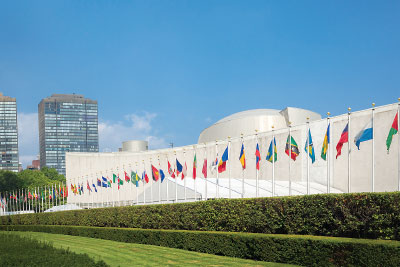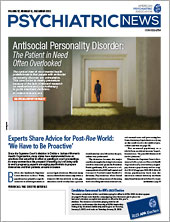APA is protesting the abduction of school-aged Iranian protesters and their detention in mental health institutions to reform what Iranian authorities have labeled “antisocial” behavior.
In an October 27 letter to Volker Türk, the United Nations (U.N.) High Commissioner for Human Rights in Geneva, APA President Rebecca Brendel, M.D., J.D., and APA CEO and Medical Director Saul Levin, M.D., M.P.A., said the abduction and detention of children—as alleged by several media reports and human rights organizations—“is a serious human rights violation and abuse and misuse of psychiatry, which can result in long-term mental health consequences.”
They added, “APA maintains a long history of firmly opposing the abuse and misuse of psychiatry and psychiatric facilities for the detention of persons solely on the basis of their political dissent, no matter where it occurs, because it violates basic human rights and can cause long-lasting psychiatric harm.”
The letter was co-signed by 13 other psychiatric organizations.
Brendel and Levin urged Türk to act swiftly. “We join human rights organizations in urging the United Nations Human Rights Council to act with urgency by holding a special session to establish an independent mechanism with investigative, reporting, and accountability functions to address these reports of human rights violations and abuse and misuse of psychiatry in Iran.”
They noted in their letter that Iranian Education Minister Yousef Nouri, in a recent interview with the independent reformist newspaper Shargh, confirmed that an unspecified number of students have been taken to “psychological institutions” to “reform and re-educate” them to prevent “antisocial” behavior. Brendel and Levin wrote: “Nouri further stated that the Islamic Republic ‘want[s] to correct’ these protesters and that they ‘will be returned to the school environment once expert friends have done their work’ in such mental health centers.”
In a statement shared with the APA Office of International Affairs, the Society of Iranian Psychiatrists of North America (SIPNA) highlighted the following specific concerns:
•
Detaching and disconnecting school-aged children and adolescents from their safety network and support systems employing force against their will or the will of their parents and families is by itself considered an act of violence.
•
The misuse and abuse of correctional mental health facilities as a tool for suppressing the free expression of voices is not only contrary to the principles of medical ethics, but it can also further negatively impact judgments and stigmatize mental illnesses at a societal level.
•
Separating children and youth from their safety network and support systems under the current highly stressful atmosphere and the situation will further negatively impact their mental health and well-being.
•
Authorities have precipitated a sense of fear, mistrust, anger, and insecurity within Iranian society, especially schools, universities, and educational environments, which are designed to be a place for growth, comfort, and safety.
SIPNA further stated that these actions directly contravene principles outlined by United Nations Children’s Fund and the Convention of Children’s Rights. “We agree that children and adolescents are the ultimate capital of every nation, and every government must create and guarantee a healthy environment for their growth and flourishing,” the SIPNA statement asserted. “In conclusion, SIPNA firmly condemns the behaviors as stated above and strongly advocates for the return of these individuals as soon as possible to their families to ensure protection from irreparable damage to their mental health and further losses within the Iranian community and the world community at large.”
APA’s Office of International Affairs also reported that it has received letters of protest by the Iranian Psychiatric Association and the Iranian Child and Adolescent Psychiatric Association in Iran to the Iranian Minister of Education.
In their letter to the U.N., Brendel and Levin included three APA position statements. They address the use of psychiatric institutions for the commitment of political dissenters (originally approved by the board in 1994 and reaffirmed in 2016), abuse and misuse of psychiatry (approved in 2019), and human rights (approved in 2017).
“Psychiatry is a healing profession and not a tool to silence political dissent,” they wrote. “‘Psychiatric confinement’ for any purpose other than the evaluation and treatment of mental illness to promote individuals’ mental health violates psychiatric ethics and is associated with long-term negative health consequences. This concern is especially serious for school-aged children, for whom such confinement may be an adverse childhood experience, which may increase a child’s risk for developing mental illness and result in higher rates of maladaptive coping, anxiety, and chronic physical illness. Using psychiatry as a tool to pathologize political dissent and detain young protesters is a serious ethical, medical, and moral abuse of psychiatry.”
The co-signers to the letter are Academy of Consultation-Liaison Psychiatry, American Academy of Addiction Psychiatry, American Academy of Child and Adolescent Psychiatry, American Academy of Psychiatry and the Law, American Association for Community Psychiatry, American Association for Emergency Psychiatry, American Association for Geriatric Psychiatry, American Association for Social Psychiatry, American Psychoanalytic Association, American Society for Adolescent Psychiatry, Association of Medicine and Psychiatry, Association of Family Psychiatrists, and the Association of Women Psychiatrists. ■
Position statements are posted in the Policy finder on
APA’s website.

